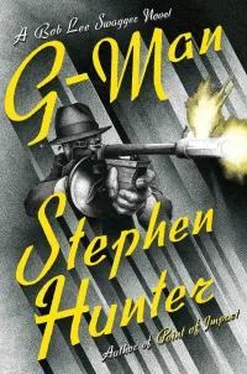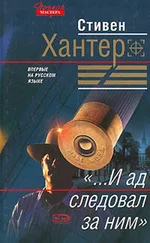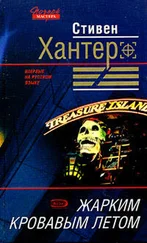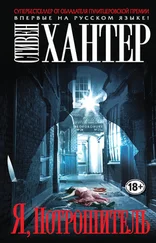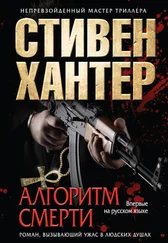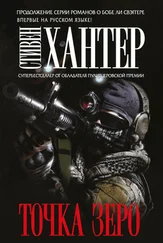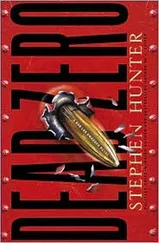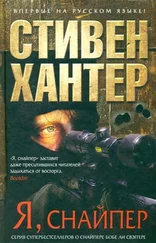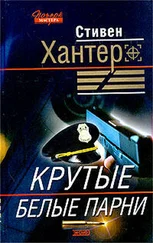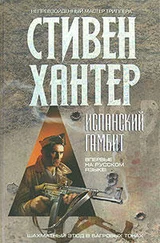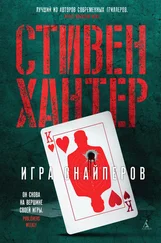Стивен Хантер - G-Man
Здесь есть возможность читать онлайн «Стивен Хантер - G-Man» весь текст электронной книги совершенно бесплатно (целиком полную версию без сокращений). В некоторых случаях можно слушать аудио, скачать через торрент в формате fb2 и присутствует краткое содержание. Жанр: Старинная литература, на английском языке. Описание произведения, (предисловие) а так же отзывы посетителей доступны на портале библиотеки ЛибКат.
- Название:G-Man
- Автор:
- Жанр:
- Год:неизвестен
- ISBN:нет данных
- Рейтинг книги:3 / 5. Голосов: 1
-
Избранное:Добавить в избранное
- Отзывы:
-
Ваша оценка:
- 60
- 1
- 2
- 3
- 4
- 5
G-Man: краткое содержание, описание и аннотация
Предлагаем к чтению аннотацию, описание, краткое содержание или предисловие (зависит от того, что написал сам автор книги «G-Man»). Если вы не нашли необходимую информацию о книге — напишите в комментариях, мы постараемся отыскать её.
G-Man — читать онлайн бесплатно полную книгу (весь текст) целиком
Ниже представлен текст книги, разбитый по страницам. Система сохранения места последней прочитанной страницы, позволяет с удобством читать онлайн бесплатно книгу «G-Man», без необходимости каждый раз заново искать на чём Вы остановились. Поставьте закладку, и сможете в любой момент перейти на страницу, на которой закончили чтение.
Интервал:
Закладка:
“Teletype. Interrogation, interrogation, interrogation, with one-way mirror and observation room available, Mr. Cowley’s office—”
“He’s back here?”
“It’s his preference. No name on the door, no receptionist’s office, no secretary. He’s in there by himself, and he types his own memos. Most days, you won’t see him, as he’s going over reports, on the phone with Washington or other field offices, talking to various law enforcement entities, that sort of thing. He makes assignments, keeps track of case progress, looks to cut down on duplicated effort or step in if communication breaks down somewhere. But every morning there’s a fresh memo on the bulletin board, and if you’re mentioned in it, it’s a good sign.”
“He seemed like the no-bull sort, didn’t need much attention.”
“That would describe him perfectly. Even though he was a minister for two years, saving heathen souls in Hawaii, he’s a technical. Everything by the book, then recorded in the book, the book then sent to Washington for the Director’s pleasure. Here we are.”
Clegg led him into a large room, clearly a rough or wet room, meant for gunwork. A bench stood against the wall, with gunsmith’s tools, and jars of Hoppe’s No. 9 and Rem Oil, the pungent stench of the Hoppe’s clouding the air almost visibly.
“Is there an armorer?”
“We have a young agent named Ed Hollis who has recently inherited this room as one of his administrative duties. He’s more of a glorified clerk than an actual armorer, much less a gunsmith. He keeps track of ammo, records the guns coming in and going out, fills out a report if anything is damaged in a fight, ships guns to D.C. for lab work — really, it’s a hard, crummy, filthy job. But he earned it. He was at Little Bohemia and did not distinguish himself, so I thought it better to take him out of the lineup, so to speak, for a bit.”
It was your plan, thought Charles.
“He also runs the motor pool now, and maybe he’s tending to that. But on a day-by-day if you’ve got the possibility of a serious engagement and you need to check out a bigger weapon, you file with me and I’ll approve it and unlock the vault.” He gestured to the large steel door in the wall. “We store them in there. When you return, you bring your chit back to me for filing. That way, we always know what’s out, what’s not. The last thing we want to do is misplace a Thompson. The newspapers would fry us.”
Troutmouth added, “The reason the gun room is here is because that”—he pointed—“was already there.”
It was a grating, behind which, in squalid splendor, rough-walled, dirty, its paint peeling, lit by a single bulb, was a freight elevator. “We had it rewired so it only stops here on nineteen and in the lower-level garage, where our cars are. If we load for bear, that’s how we get to our vehicles. Don’t want to be storming through the lobby with machine guns and Browning rifles, looking like one of those army raiding parties.”
Charles nodded.
“Any questions?” asked Clegg.
“I’ll have much business for Hollis later today. Does he, by the way, know anything about guns?”
“I don’t know if he can take them apart or not, but I do know he has no idea when to shoot them.”
Charles realized that it was, therefore, Hollis who had fired first on the three civilians getting into their car after dinner at the Little Bohemia Lodge. What was he supposed to do? Let them escape? Why wasn’t there an alternative plan, or a fallback against just this situation? Why hadn’t it been anticipated, as, after all, the agents had had time to fly up to northern Wisconsin, rent cars, and move to the lodge two hours from the Eagle River Airport? So this wasn’t an operational mistake, it was a tactical one: poor planning by Clegg here, and it’s Hollis who gets hung out to dry. He’d seen it all over the army.
“Now, one last thing,” said Clegg. “This way, please, Sheriff.”
He took Charles back to the squad room, and when they entered — and this time, word having gotten around — all the typing stopped, as did the chatting, the writing, the paper-shuffling. Charles felt eyes upon him but did not acknowledge them.
Clegg led him to a big wall and upon it were the faces of the men they were hunting.
“You’d best get to know these faces like your own children’s,” said Clegg, annoying Charles because of course he already did.
Clegg rattled off the names. “Homer Van Meter, Harry Pierpont, Pretty Boy Floyd, the little pug is Les Gillis, known as Baby Face Nelson, a name he’s said to hate. And that one there, that’s the big dog, John Dillinger himself, Public Enemy Number One.”
Dillinger didn’t look like much more than a potato-faced fertilizer salesman in a small Indiana town, which is how he might have ended up had he not been sentenced to twenty-five years for a rather minor crime when he was nineteen. In prison, he learned a trade, and like any trained man, when he got out he looked for a way to make a living practicing that trade.
“He’s no genius, believe me, and possibly not even the leader of the gang. He doesn’t make plans or anything, he doesn’t scheme and plot, and there’s no record of him having a particular need to hurt or kill. He wasn’t a tough guy in the joint. In fact, they once found him snuggled in bed with another guy, so who knows what’s going on. This one is the psychopath.”
Clegg’s elegant, polished finger came to rest on the square face of a guy who could have been in the Our Gang comedies, for he resembled the little picture-show boy Mickey McGuire more than anybody else, with a square, uptilted nose that spread his nostrils, a tumble of lengthy, pomaded hair full of blond highlights, a pair of small but not menacing eyes, and a blur of matinee-idol, make-believe mustache.
“Don’t know what makes him tick,” said Clegg. “But he’s a monster, that’s for sure, and poor Carter Baum found out the hard way at Little Bohemia. Baby Face killed Carter in one second. If you see Baby Face any other way than over a gunsight, he’s probably going to kill you.”
CHAPTER 8
GREENCASTLE, INDIANA
June 15, 1934
Nobody was in a good mood, except for that idiot Homer. But Les was in the worst mood of all. Tommy Carroll’s death hit him the hardest. He’d driven into Little Bohemia with Tommy sitting next to him, Helen in the back, and as old friends and colleagues who’d been on the wrong end of enough cop gunfire to know and trust one another well, the trip had been fun. Helen liked Tommy too; he was a big, handsome lug from Montana whose jaw had been busted in his boxing days and never set right, so that at its new angle, it looked like a lantern, making him look stupid, but of course he was not stupid.
But the way Tommy Carroll had died had been stupid. Not on a job, not in a police ambush, not in a betrayal or a plot, but just by the dumb-bunny roll of the dice.
He makes it out of Little Bohemia, the federals blazing away with choppers and filling the air with a blizzard of hardball and not a one comes near Tommy. And he gets downed by two hick detectives in a town called Waterloo, Iowa. The coppers probably didn’t even know who he was.
“When your time is up, your time is up,” said Johnny. “That’s our business. That’s the risk.”
Johnny would know. “Johnny” to his pals, he was John Dillinger, the most famous bank robber in the world. He had a gift for publicity, a vivid personality, a terrible beauty, and a sublimely cool aspect that enchanted everyone, friend or foe. Plus, a genius for escape, over and above his criminal skills. Twice he’d wriggled out of tough joints, once with pals and once on his own genius with three cents’ worth of scrap wood and shoe polish. He was a great criminal.
Читать дальшеИнтервал:
Закладка:
Похожие книги на «G-Man»
Представляем Вашему вниманию похожие книги на «G-Man» списком для выбора. Мы отобрали схожую по названию и смыслу литературу в надежде предоставить читателям больше вариантов отыскать новые, интересные, ещё непрочитанные произведения.
Обсуждение, отзывы о книге «G-Man» и просто собственные мнения читателей. Оставьте ваши комментарии, напишите, что Вы думаете о произведении, его смысле или главных героях. Укажите что конкретно понравилось, а что нет, и почему Вы так считаете.
